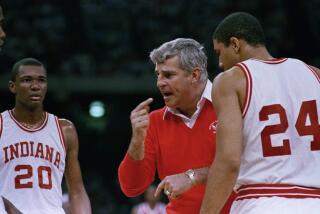PASSINGS: Dave Gavitt, Wilma Lee Cooper, James Speed, James N. Rosenau, Yuli Ofer, Kurt Ziebart
Dave Gavitt
Coach led organization
of Big East Conference
Dave Gavitt, 73, one of basketball’s most influential leaders in the last three decades, died Friday in a hospital near his hometown of Rumford, R.I., after a long illness, his family said.
Gavitt coached Providence College to the NCAA tournament five times, including the Final Four in 1973. He was the driving force behind the formation of the Big East Conference and was its first commissioner. He was selected to coach the U.S. Olympic team in 1980, but the United States boycotted the Moscow Games. Gavitt was president of USA Basketball and oversaw the introduction of NBA players onto the U.S. Olympic roster, including the Dream Team at the 1992 Games.
“He was not only a great basketball coach and organizer of the Big East but he was a great, great statesman for basketball, college and international,” former St. John’s University coach and fellow Naismith Hall of Famer Lou Carnesecca said.
Gavitt was the Big East’s commissioner from 1979 until 1990. He served on the NCAA’s Division I Basketball Committee from 1980 to 1984 and was its chairman from 1982 to 1984, when the tournament expanded to 64 teams and the first of its TV contracts with CBS was negotiated.
When he left the Big East, Gavitt joined the Boston Celtics’ front office as a vice president, succeeding Red Auerbach in running the franchise. He was fired in 1994.
Gavitt served as chairman of the Basketball Hall of Fame, to which he was inducted in 2006. He was president of the NCAA Foundation and worked as tournament director of the Maui Invitational from 2005 until 2009.
Born Oct. 26, 1937, in Westerly, R.I., Gavitt played basketball and baseball at Dartmouth, graduating from the Ivy League school in 1959. He was an assistant coach at Providence for two years before starting his head coaching career in 1967 at Dartmouth.
He became head coach at Providence in 1969 and led the Friars to a 209-84 record over 10 seasons for a .713 winning percentage that is still the best in school history. He became the school’s athletic director in 1971.
Wilma Lee Cooper
Singer, songwriter in duo with
husband at Grand Ole Opry
Wilma Lee Cooper, 90, a singer-songwriter who with her husband, fiddler Stoney Cooper, made up one of country music’s top duos, died Sept. 13 of natural causes at her home in Sweetwater, Tenn., according to the Grand Ole Opry.
In 1950, Harvard University named Cooper America’s “most authentic mountain singer,” and the Smithsonian Institution honored her as the First Lady of Bluegrass in 1974.
She had “a voice that can stop a clock and send the hands of time racing backward to an era when a mournful ballad and country music were one and the same,” the Washington Post said in 1982.
A skilled banjoist, guitarist and organist, she wrote or co-wrote some of their most successful compositions, including “Cheated Too,” “Loving You,” “I Tell My Heart” and “Heartbreak Street.”
Born Wilma Lee Leary in 1921 in West Virginia, she grew up singing with her parents and siblings in a bluegrass and gospel group called the Leary Family.
About the time she obtained a degree in banking from Davis & Elkins College, she met and married Cooper. They began recording in the late 1940s and performed regularly at the Opry from 1957 until he died at the age of 58 in 1977.
She continued as a solo singer on the show until 2001, when she had a stroke onstage.
The Coopers’ daughter, Carol Lee, began performing at the Opry in 1975.
James Speed
Basketball player
went blind in college
James Speed, 61, a former Imperial Valley Junior College basketball player whose career was cut short when he went blind in 1971, died Wednesday in Las Vegas of complications from liver cancer. The University of Iowa announced Speed’s death.
Iowa recruited Speed, a 6-foot-7 forward from Shreveport, La., after two standout seasons at Imperial Valley. Before he ever played a game at Iowa, he lost his sight in both eyes after contracting a sinus infection and bacterial meningitis.
After losing his sight, Speed worked as a basketball coach and most recently in real estate. He had lived in Las Vegas since the mid-1970s.
James N. Rosenau
Author, USC political
science professor
James N. Rosenau, 86, a retired professor of political science at USC who studied foreign policy and globalization, died Sept. 9 at an assisted-living facility in Louisville, Colo., after suffering a stroke, his family said.
A member of the USC faculty from 1973 to 1992, Rosenau taught international affairs at George Washington University from 1992 until his retirement in 2009.
Rosenau was the author or editor of 50 books, including “Turbulence in World Politics” (1990), as well as many other academic papers.
He was born in Philadelphia on Nov. 25, 1924. After enrolling in the University of Wisconsin, he was drafted into the Army and served with the Office of Strategic Services in Europe during World War II.
When he came back from the war, Rosenau returned to college and received his bachelor’s degree from Bard College, a master’s from Johns Hopkins University and a doctorate from Princeton University.
During his college years, he compiled and edited the second volume of President Franklin Roosevelt’s personal letters, spanning 1905 to 1929.
Rosenau taught at Rutgers University and Ohio State University before arriving at USC. He was president of the International Studies Assn. in 1984-85.
Yuli Ofer
Wealthy partner in
Israeli business empire
Yuli Ofer, 87, one of Israel’s richest men, died at his home near Tel Aviv on Sept. 8, just months after the death of his longtime business partner and brother, Sammy Ofer.
The brothers built a sprawling business empire that included holdings in international shipping, real estate, chemicals and banking. They divided their assets in recent years, but media have reported that their joint worth ranged from $4 billion to $10 billion.
Ofer had emigrated from Romania with his family in 1924.
Earlier this year, the U.S. government sanctioned Sammy Ofer’s company, Ofer Bros. Group, for selling an oil tanker to Iran through a Singapore subsidiary in violation of U.S. trade restrictions on Tehran.
Kurt Ziebart
Invented rustproofing
process for autos
Kurt Ziebart, 91, who pioneered the innovative rustproofing process for automobiles that bears his name, died Sept. 12 at his home in Williamsburg, Mich., said his wife, Edith.
Born in 1920 in Germany, he was a master auto mechanic who immigrated to the U.S. in 1953 and developed his rustproofing process the next year. The idea for it came from German visitors who observed that Americans “drove totally rusted-out automobiles,” his wife said.
He tried unsuccessfully to interest General Motors and other automakers in his chemical process, so he created an after-market business to protect cars from rust, she said.
In 1959, he opened his first store in Detroit, called Ziebarts, to rustproof automobiles from the ravages of rain, snow and ice.
When it was still a small operation, he sold the business in 1963. Based in the Detroit suburb of Troy, it evolved into Ziebart International Corp. with 400 outlets in 30 countries, according to its website.
“I’ve never had a regret,” Ziebart told Autoweek in 1989. “My partners and I couldn’t decide what way we should go, so I sold my interest.”
Ziebart moved to northern Michigan, bought a Mercedes-Benz dealership that he kept until 1988 and built a home overlooking the water.
Times staff and wire reports
More to Read
Start your day right
Sign up for Essential California for news, features and recommendations from the L.A. Times and beyond in your inbox six days a week.
You may occasionally receive promotional content from the Los Angeles Times.






